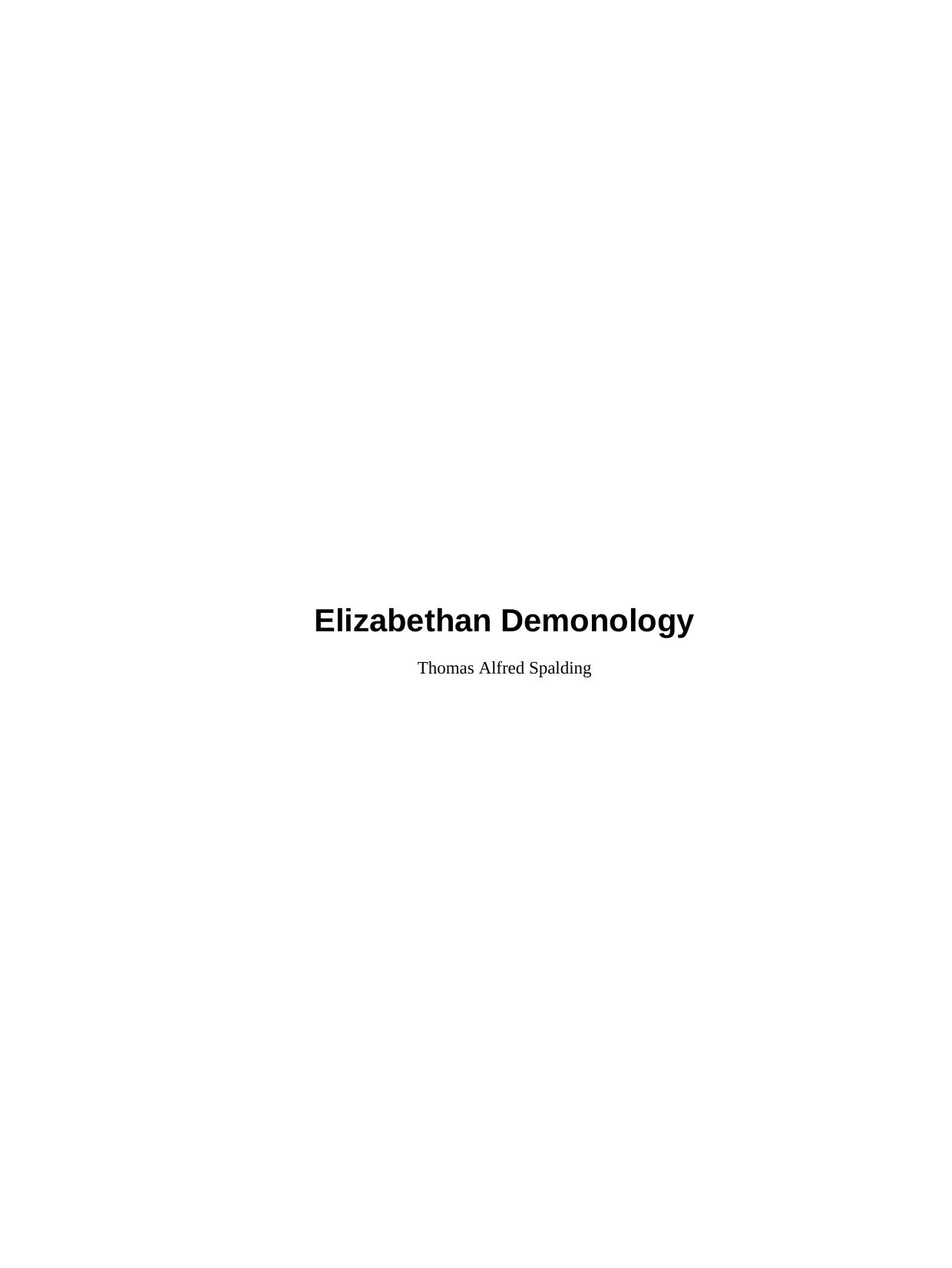Elizabethan Demonology by Thomas Alfred Spalding

Author:Thomas Alfred Spalding [Spalding, Thomas Alfred]
Language: eng
Format: epub, pdf
ISBN: 9781517727826
Barnesnoble:
Publisher: CreateSpace Publishing
Published: 2015-10-09T00:00:00+00:00
[Footnote 1: "Dog in madness, lion in prey."âl. 96.]
[Footnote 2: "Wolf in greediness."âIbid.]
[Footnote 3: "Hog in sloth."âl. 95.]
[Footnote 4: Harsnet, p. 278.]
A sort of prayer-meeting was then held for the relief of the distressed youth: "Whereupon the spirit of Pride departed in the forme of a Peacocke; the spirit of Sloth in the likenesse of an Asse; the spirit of Envy in the similitude of a Dog; the spirit of Gluttony in the forme of a Wolfe."[1]
[Footnote 1: The words, "Hog in sloth, fox in stealth, wolf in greediness, dog in madness, lion in prey," are clearly an imperfect reminiscence of this part of the transaction.]
There is in another part of "King Lear" a further reference to the incidents attendant upon these exorcisms Edgar says,[1] "The foul fiend haunts poor Tom in the voice of a nightingale." This seems to refer to the following incident related by Friswood Williams:â
"There was also another strange thing happened at Denham about a bird. Mistris Peckham had a nightingale, which she kept in a cage, wherein Maister Dibdale took great delight, and would often be playing with it. This nightingale was one night conveyed out of the cage, and being next morning diligently sought for, could not be heard of, till Maister Mainie's devil, in one of his fits (as it was pretended), said that the wicked spirit which was in this examinate's sister[2] had taken the bird out of the cage, and killed it in despite of Maister Dibdale."[3]
[Footnote 1: Act III. sc. vi. l. 31.]
[Footnote 2: Sara Williams.]
[Footnote 3: Harsnet, p. 225.]
73. The treatment to which, in consequence of his belief in possession, unfortunate persons like Mainy and Sommers, who were probably only suffering from some harmless form of mental disease, were subjected, was hardly calculated to effect a cure. The most ignorant quack was considered perfectly competent to deal with cases which, in reality, require the most delicate and judicious management, combined with the profoundest physiological, as well as psychological, knowledge. The ordinary method of dealing with these lunatics was as simple as it was irritating. Bonds and confinement in a darkened room were the specifics; and the monotony of this treatment was relieved by occasional visits from the sage who had charge of the case, to mumble a prayer or mutter an exorcism. Another popular but unpleasant cure was by flagellation; so that Romeo's
"Not mad, but bound more than a madman is,
Shut up in prison, kept without my food,
Whipped and tormented,"[1]
Download
Elizabethan Demonology by Thomas Alfred Spalding.pdf
This site does not store any files on its server. We only index and link to content provided by other sites. Please contact the content providers to delete copyright contents if any and email us, we'll remove relevant links or contents immediately.
The Memoirs of Pere Labat, 1693-1705 by Jean Baptiste(175)
Water by John Boyne(136)
The Memoirs of Count Grammont â Complete by Hamilton Anthony Count Walter Scott(111)
Famous Fights of Indian Native Regiments by Reginald Hodder(105)
A History of the Peninsular War, Vol. 5, Oct. 1811-Aug. 31, 1812 by Charles Oman(99)
1916 - The Battle of the Five Empires: 15 May - 28 September 1916 by Benoît Chenu(95)
Maleficium: Witchcraft and Witch Hunting in the West by Gordon Napier(91)
Life of Napoleon Bonaparte, Volume I. by Walter Scott(87)
Evolution Of The Japanese, Social And Psychic by Sidney Lewis Gulick(86)
The Apollo Moon Missions by Randy Walsh(83)
Famous Reviews, Selected and Edited with Introductory Notes by R. Brimley Johnson by Various R. Brimley Johnson(81)
Joanna of Flanders by Julie Sarpy(76)
Memoir of the Life and Services of Vice-Admiral Sir Jahleel Brenton, Baronet, K.C.B by Various Henry Raikes(73)
Fry The Brain: The Art of Urban Sniping and its Role in Modern Guerrilla Warfare by John West(73)
Inns and Taverns of Old London by Henry C. Shelley(70)
Elizabethan Demonology by Thomas Alfred Spalding(67)
Rasputin the Rascal Monk by William Le Queux(66)
History of the Revolt of the Netherlands â Complete by Friedrich Schiller(64)
A Winter Tour in South Africa by Frederick Young(62)
